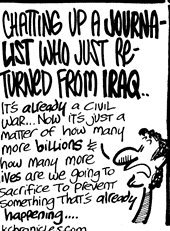Yesterday was August Bank Holiday in England. This is a fine holiday with many well-loved traditions, such as inching along on the motorway (AmE = highway, expressway, and various regional things like thruway and turnpike) while colo(u)rfully cursing, getting rained on at the beach, withstanding your in-laws, and standing in a long queue (AmE = line) at a DIY superstore then going home to decorate (which usually means painting).
The term Bank Holiday is pretty much equivalent to AmE legal holiday or public holiday. The US and UK have a couple of holidays in common--Christmas and New Year's Day. In the US, public holidays celebrate famous figures (Columbus Day, Martin Luther King Day, Presidents' Day), events (Thanksgiving) or issues/groups of people (Labor Day, Memorial Day, Veterans' Day). Which holidays are public holidays varies by state. For example, Massachusetts has an extra one called Patriots' Day--which, I might add, is to commemorate the battles of Lexington and Concord in the (AmE) Revolutionary War/ (BrE) American War of Independence, not the New England Patriots (American) football team. Click here for a site that tells you when US federal holidays and traditional secular observances take place.
In the UK, holidays generally allow for days off around Christian feasts (Christmas, Good Friday, Easter Monday, Boxing Day--which I've now discussed here) or celebrate the fact that the banks are closed (May Bank Holiday, Spring Bank Holiday [also in May], and August (aka Summer) Bank Holiday). August Bank Holiday is timed to co-occur with the dampening of the weather as hurricane season gets started in the Atlantic. Dates of holidays in the four nations of the UK can be found here,
England has the fewest public holidays in Europe, fewer than Scotland and fewer than the US as well. I practice my own "go-slow" on Columbus Day and Martin Luther King Day, and get downright rude at work on Thanksgiving. I don't do this because I'm patriotic--I just feel I'm owed a few more holidays. Only the May bank holidays fall during the university term, but they fall during exam time, and they don't close the university as there are too many exams to fit into the exam period.
So, I'm absolutely in favo(u)r of more bank holidays, but I would like to campaign to give them better and more diverse names. If the British can't think of things to celebrate, then at least the holidays could be named after other holiday traditions besides the closing of the banks. How about Trains on a Reduced Schedule Monday or Don't even think about driving on the M6 Day?
What British holidays would you like added to the roster?
Read more
The term Bank Holiday is pretty much equivalent to AmE legal holiday or public holiday. The US and UK have a couple of holidays in common--Christmas and New Year's Day. In the US, public holidays celebrate famous figures (Columbus Day, Martin Luther King Day, Presidents' Day), events (Thanksgiving) or issues/groups of people (Labor Day, Memorial Day, Veterans' Day). Which holidays are public holidays varies by state. For example, Massachusetts has an extra one called Patriots' Day--which, I might add, is to commemorate the battles of Lexington and Concord in the (AmE) Revolutionary War/ (BrE) American War of Independence, not the New England Patriots (American) football team. Click here for a site that tells you when US federal holidays and traditional secular observances take place.
In the UK, holidays generally allow for days off around Christian feasts (Christmas, Good Friday, Easter Monday, Boxing Day--which I've now discussed here) or celebrate the fact that the banks are closed (May Bank Holiday, Spring Bank Holiday [also in May], and August (aka Summer) Bank Holiday). August Bank Holiday is timed to co-occur with the dampening of the weather as hurricane season gets started in the Atlantic. Dates of holidays in the four nations of the UK can be found here,
England has the fewest public holidays in Europe, fewer than Scotland and fewer than the US as well. I practice my own "go-slow" on Columbus Day and Martin Luther King Day, and get downright rude at work on Thanksgiving. I don't do this because I'm patriotic--I just feel I'm owed a few more holidays. Only the May bank holidays fall during the university term, but they fall during exam time, and they don't close the university as there are too many exams to fit into the exam period.
So, I'm absolutely in favo(u)r of more bank holidays, but I would like to campaign to give them better and more diverse names. If the British can't think of things to celebrate, then at least the holidays could be named after other holiday traditions besides the closing of the banks. How about Trains on a Reduced Schedule Monday or Don't even think about driving on the M6 Day?
What British holidays would you like added to the roster?





